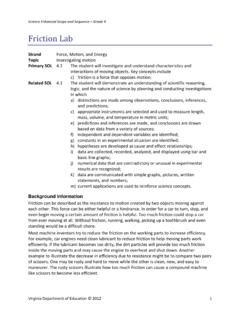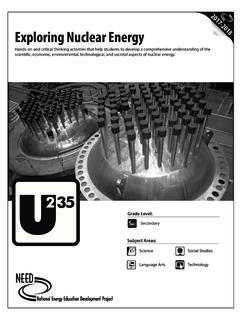Transcription of WORKING SCIENTIFICALLY WORKING SCIENTIFICALLY
1 WORKING . WORKING SCIENTIFICALLY : SCIENTIFICALLY : Implementing and Assessing Open Investigation Work in Science A resource book for teachers of primary and secondary science WORKING . WORKINGSCIENTIFICALLY: SCIENTIFICALLY : Implementing and Assessing Open Investigation Work in Science A resource book for teachers of primary and secondary science Mark W. Hackling Edith Cowan University Revised edition 2005. Department of Education and Training, Western Australia 2005. Reproduction of this work in whole or part for educational purposes within an educational institution and on condition that it not be offered for sale is permitted by the Department of Education and Training. SCIS No.
2 1236256. ISBN 0 7307 4146 X. WO R K I N G SCIENTIFICALLY . Foreword This new edition of WORKING SCIENTIFICALLY reflects the changes that are evident in the Outcomes and Standards Framework as part of phase two of Curriculum Improvement Program (CIP). These changes, which include the introduction of standards and a revision of the language of the Student Outcome Statements, have been made in response to a department review of the CIP. The WORKING SCIENTIFICALLY outcomes in the Curriculum Framework are process outcomes that include Investigating. This outcome has been selected for the standard for Science in Years 5, 7 and 9 as it is a process central to science. Investigations stimulate student interest in science and provide a vehicle through which conceptual understandings can be developed further.
3 For students to improve their understanding of this process and their capacity to use it to test their own ideas and solve problems, they need to be provided with opportunities to plan and conduct their own investigations, process and analyse their data and reflect on their findings. Teachers have now taken on the challenge of implementing investigation work with their students. Professor Mark Hackling, the author of this book, has worked with many teachers in researching effective ways of implementing this approach in the classroom. This revised publication provides support for teachers in understanding the process of scientific investigation, implementing investigations with their students, monitoring students' progress, and planning for each student's improvement.
4 I am confident that this resource will make a very useful contribution in supporting teachers to implement the Outcomes and Standards Framework. PAM MOSS. DIRECTOR, EARLY YEARS, K-10 ACADEMIC STANDARDS AND SUPPORT. August 2005. WO R K I N G SCIENTIFICALLY . CONTENTS. Page The WORKING SCIENTIFICALLY approach to open investigation work in science 2. Why do we include practical work in science? 2. What are open investigations? What does it mean to investigate SCIENTIFICALLY '? 4. How does investigation work open the door to conceptual learning? 5. How does investigation fit the 5Es model of instruction? 5. The cognitive apprenticeship approach to teaching and learning of investigation processes 9.
5 The variables structure of an investigation 10. Types and examples of investigations 11. Implementing open investigations in science 14. Barriers to change 14. Scaffolding students' investigations, using planning and report sheets 14. Other scaffolding tools 18. Cooperative learning strategies for effective investigation work 19. Assessing open investigations using Student Outcome Statements 20. Purposes of assessment 20. Sources of assessment information 20. Using the Outcome to make judgements about students' achievement 22. Using formative assessment to inform teaching and learning 24. Using portfolios for assessment of open investigation work 24. References 25. Appendix 26.
6 1: Early and middle childhood planning and report sheet 27. 2: Middle childhood and early adolescence planning and report sheet 29. 3: Early and late adolescence planning and report sheet 32. 4: The five steps of investigation 39. 5: Roles for cooperative group work 40. 6: Investigating outcome 41. 7: Science investigations self-evaluation checklist 43. 1. The WORKING SCIENTIFICALLY approach to open investigation work in science Why do we developing investigation and different types of learning problem-solving skills; outcomes. It is therefore important include practical developing techniques and to match the type of practical work to the intended learning work in science?
7 Manipulative skills associated with outcome and to provide a wide using scientific equipment; range of practical experiences so When teachers are asked why they experiencing and developing an that students have opportunities to include practical work in science, develop a greater range of understanding of the nature of the answer given often varies learning outcomes. science; and between primary and secondary teachers. Reasons given usually conceptual development. The degree of openness of include providing opportunities for: practical activities can be Primary teachers tend to place more assessed in terms of whether it is language development; the teacher or student who emphasis on reasons in the first half learning to work cooperatively; of the list and secondary teachers to decides the problem to be place more emphasis on reasons in investigated, the equipment to be concrete experiences of natural the second half of the list.
8 Used, the procedure for setting up phenomena; equipment and making There are many different forms of observations and measurements, stimulating curiosity and practical work: for example, and the conclusions to be drawn. creativity;. demonstrations, practical exercises, These criteria can be used to motivation and enjoyment of fieldwork and open investigations. classify practical activities into science; Each provides opportunities for categories as shown in Table 1. Level Problem Equipment Procedure Answer Common name 0 Given Given Given Given Verification 1 Given Given Given Open Guided inquiry 2a Given Given Open Open Open guided inquiry 2b Given Open Open Open Open guided inquiry 3 Open Open Open Open Open inquiry Table 1.
9 Levels of openness of inquiry in laboratory activities (after Hegarty-Hazel, 1986). 2. WO R K I N G SCIENTIFICALLY .. At the lowest level of inquiry (Level included in the Overarching Science has many methods 0), the problem to be investigated, Statement, the Science Learning of investigation, but all are the equipment to be used, the Area Statement (Curriculum based on the notion that procedure and the answer to the Council, 1998), and the Key evidence forms the basis for problem are all given to the Competencies (Mayer, 1993). defensible conclusions .. students by the teacher or by a Science education empowers worksheet. At the highest level of The core skills of scientific students to be questioning, inquiry (Level 3), the students are reasoning entail the coordination of reflective and critical thinkers.
10 Existing theories with new evidence It does this by giving them required to determine all of these particular ways of looking at for themselves. bearing on them (Kuhn, Schauble &. the world and by emphasising Garcia-Mila, 1992). Scientific the importance of evidence in Many would now argue that the theories stand in relation to actual student should be involved in selecting the problem or variables to be investigated, and that the problem should be embedded in a or potential bodies of evidence against which they can be evaluated (Kuhn, 1989). Gott and Duggan (1996) have argued that forming conclusions.. Curriculum Council (1998). pp. 218-219. context familiar to the student for understanding the nature of the learning experience to be scientific evidence, which is based meaningful and represent authentic on competencies associated with science (Woolnough, 1994).


